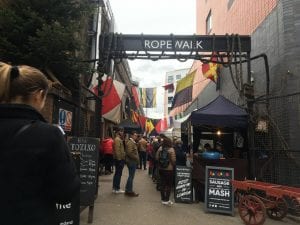Before leaving to go abroad, Whitman hosted a session dedicated to preparing us for our semesters abroad. One of their biggest aims in hosting this session was to prepare us for culture shock, the experience which results from being completely and immediately immersed in a culture that is not your own. While I have experienced many new things since being here, and a wide range of emotions to accompany each experience, I don’t feel as though I’ve experienced the symptoms of “culture shock” which Whitman had prepared me for.
The lack of culture shock is not exclusively due to the similarities that exist between English and American cultures, (which of course are present, ie through a shared language), but rather due to the lack of a single unifying “London culture”. While I did my best to educate myself on English culture, my London lifestyle does not emulate what I learned from watching The Crown. Maybe if I was the Queen, or if I was living in a quaint English village my experience of England would involve more stereotypical English traditions, but unfortunately, my lecture timetable (aka schedule) does not account for tea time. (Pros: I won’t get judged for putting my elbows on the dinner table, Cons: I don’t think I’ll be successful in converting from coffee to tea).
London is a BIG place, in every sense of the word. The population is massive, the city sprawls on forever, there are hundreds of hubs each filled with thousands of restaurants, shops, museums, and cultures. If anything, I would say that I am experiencing “cultures shock” as opposed to culture shock as I adjust to city life in London.
During my two weeks here, I have come across so many markets like this one, featuring every type of food imaginable. The flags above this one represented the many different ethnic foods that the market had.
Upon landing in London, I heard a lot less English than I was expecting. Standing in the “Non-EU Passport” line, this wasn’t that surprising. Nor was it very surprising on the tube from the airport into London, where a high concentration of us were foreigners. However, as I spend more time in the city, I am realizing that I continue to hear a huge variety of languages, some that I can identify and many that I cannot. Even among London’s residents, there are many people whose first language is not English. Thus, while English is the official language, and the language that is used on signs and between parties, I feel that the prevalence of English in this city is due to its internationality. As I make friends from all over the world, I have begun to feel the advantage that those of us from English speaking countries have as we are able to use our first language to communicate across nationalities, requiring much less effort on our part than for non-native English speakers. The lack of a language barrier on my part greatly reduces the impact of culture shock and cultures shock as well.
China town is very centrally located and at night it turns into a hub of social life, with restaurants, beautiful arches and lights.
I pursued a direct enrollment program because I wanted to immerse myself within a new place as wholly as possible, with as little outside help or guidance. As I said earlier, London is a very conducive place to do this. While I was expecting that through this direct enrollment experience the majority of my classmates would be citizens of the UK, this is not what I have found. In my upper level biology classes, classes that are definitely not highly coveted by “affiliate” (aka study abroad) students such as myself, I have found that there are just as many if not more international students as there are English students. UCL in general is known for being a highly international school, and I have begun to witness this everywhere, from my classes to my flatmates (all of whom are full time students, yet none of them are British).
I would define “cultures shock” as the experience of not being able to assume or predict the cultural norms of the people who you interact with. The symptoms include a heightened awareness of other cultures as well as how your own culture is perceived by others. “Cultures shock”, is really not that shocking. It exists in slang differences, in accents, and in social norms and cues which are sometimes misunderstood. Although cultural differences exist, the lines between cultures get blurred when you account for personality differences between people. After all, I am becoming friends with people for who they are and not for the cultures that they come from. Thus, we use our cultural differences to fuel engaging (and often quite comical) conversations which embody our desire to learn from each other. It is liberating to exist within a group of diverse people in which the cultural differences play into our dynamic while also being obsolete.
UCL refers to itself as “London’s Global University”, and nothing could more accurately capture the community of this school. What they don’t say, is that the diversity captured at UCL is just as present throughout the entirety of London. Despite London’s significance to Great Britain, I feel that my semester here will expose me to a much broader global experience.

